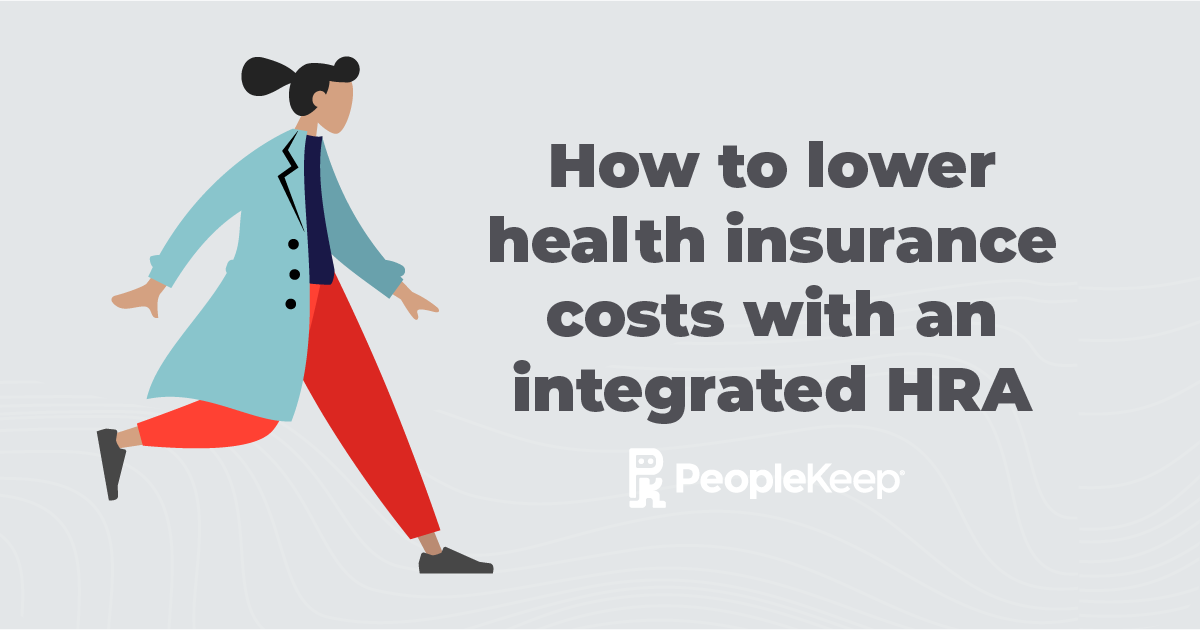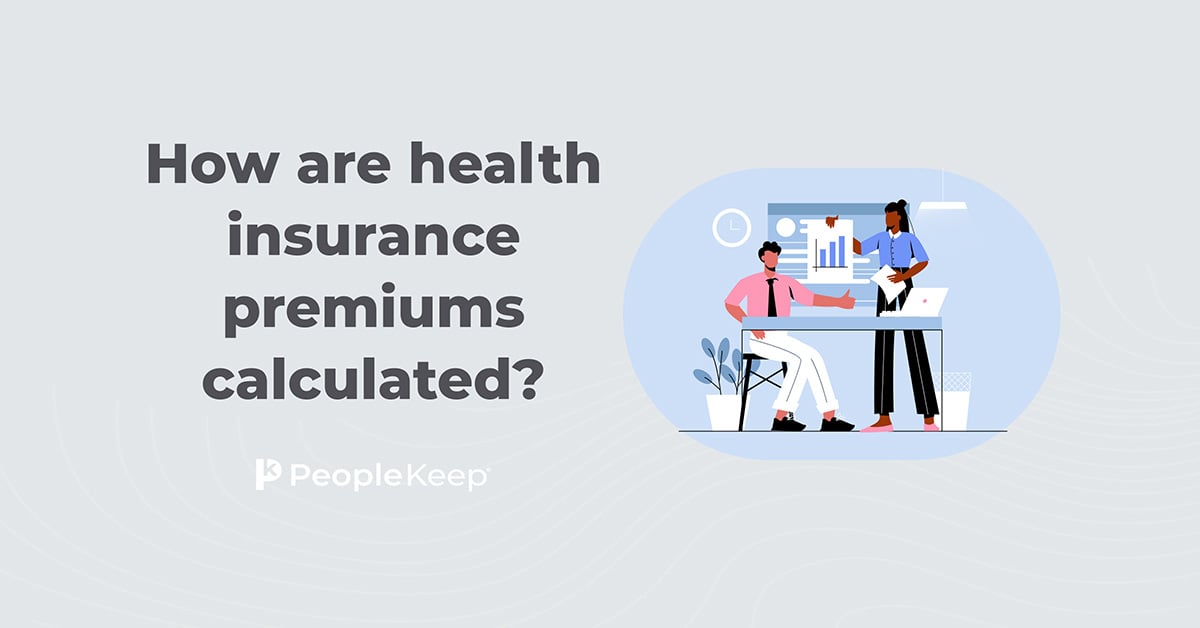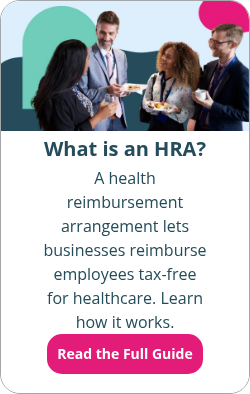Does COBRA apply to health reimbursement arrangements (HRAs)?
By Chase Charaba on December 15, 2023 at 11:20 AM
As alternative health benefits solutions to traditional group health insurance, such as health reimbursement arrangements (HRAs), grow, so do questions about how they work alongside existing benefits laws. This includes if HRAs are subject to the Consolidated Omnibus Budget Reconciliation Act of 1985 (COBRA).
In this article, we’ll cover what COBRA is and how it works with different types of HRAs.
What is COBRA?
COBRA is a federal law that allows employees, retirees, former employees, and qualifying dependents to continue their employer-sponsored group health insurance coverage after experiencing a qualifying event. This typically occurs when you reduce an employee’s hours, lay an employee off, or the employee quits or retires.
Generally, all private-sector organizations that employ at least 20 full-time equivalent employees (FTEs) on more than half of the previous year’s business days are subject to federal COBRA. However, many states have their own version of COBRA that may apply to smaller organizations.
When an employer offers a group health plan, they split the cost of the benefit, such as premiums, with their employees. If a qualifying individual elects COBRA coverage, they must pay the full price of the medical plan, including the portion the employer used to pay.
Circumstances that allow employees to get continued coverage under COBRA include:
- Voluntary or involuntary job loss, including retirement
- Reduction in hours
- Transition between jobs
- Death of the employee (thereby making dependents eligible for COBRA)
- Divorce
- Dependent loses coverage because they turn 26
- An employee becomes eligible for Medicare
Termination of employment due to gross misconduct doesn’t make the individual eligible for COBRA.
Do COBRA rules apply to HRAs?
HRAs allow employers to reimburse their employees for qualifying medical expenses. Depending on the type of HRA you offer, this can include individual health insurance premiums.
Whether or not a plan is subject to COBRA requirements depends on whether the federal government considers it a group health plan. In the case of HRAs, ERISA considers some types as group plans.
We’ll go over the various types of HRAs to give you a better idea of which ones are subject to COBRA requirements.
Is the qualified small employer HRA (QSEHRA) subject to COBRA?
The qualified small employer HRA (QSEHRA), also known as the small business HRA, allows organizations with fewer than 50 FTEs to reimburse their employees tax-free for qualifying medical expenses and individual health insurance premiums.
Because the 21st Century Cures Act created the QSEHRA as an excepted benefit to the Affordable Care Act (ACA) and ERISA, it isn’t a group health plan and therefore isn’t subject to COBRA requirements.
That means small businesses using a QSEHRA aren’t obligated to offer continuing coverage options to employees who experience any event that would entitle them to COBRA benefits under another type of benefit.
While the QSEHRA isn't subject to COBRA requirements, employees who lose QSEHRA eligibility are entitled to some benefits. Specifically, these employees can request reimbursement for any expenses they incurred before losing eligibility.
After an employee loses QSEHRA eligibility, they have up to 90 days to request reimbursement for expenses they incurred before losing eligibility.
The individual coverage HRA (ICHRA) and COBRA
With an individual coverage HRA (ICHRA), organizations of all sizes can offer personalized health benefits and reimburse employees for medical expenses and individual insurance premiums.
Because an ICHRA is subject to ERISA and the ACA as a group plan, COBRA requirements apply. However, only private-sector organizations with more than 20 FTEs are subject to federal COBRA. If an employee loses their individual health coverage, it doesn’t create a qualifying event for COBRA.
The ICHRA final rules state that plan sponsors may allow former employees to continue participation in the HRA. Still, they must maintain individual health coverage with minimum essential coverage (MEC). Qualifying individuals can continue to access their ICHRA allowances for up to 18 months after the qualifying event as long as they elect COBRA coverage and pay a premium to access the benefit. Employers can charge an additional administrative fee of 2%.
Employers can use the actuarial method (a reasonable estimate of HRA utilization and administrative fees) or past cost method (benefit utilization minus administrative fees) to determine COBRA premiums for an ICHRA.
The table below shows how to calculate COBRA premiums. It includes an example of an organization that offers a $500 monthly ICHRA allowance. For this example, let’s say the organization reimbursed employees for $400 each month on average during the previous year. The inflation rate from 2022 to 2023 was 3.2%1.
|
Method |
Equation |
Example |
|
Actuarial method |
COBRA premium = monthly ICHRA allowance + 2% administration fee |
COBRA premium = $500 + 2% admin fee COBRA premium = $500 + $10 COBRA premium = $510 |
|
Past cost method |
COBRA premium = Average amount you reimbursed per employee during the previous plan year + inflation rate + 2% admin fee |
COBRA premium = $400 + $12.80 + 2% amin fee COBRA premium = $412.80 + $8.26 COBRA premium = $421.06 |
In the scenario, using the actuarial method, the employee would pay more to access the ICHRA each month than you would reimburse them for. But, using the past cost method, the employee would still gain $78.94 each month.
Learn more about how ICHRAs work with COBRA
Integrated HRAs and COBRA
Finally, there’s the group coverage HRA (GCHRA), also known as an integrated HRA. A GCHRA allows employers offering a traditional group health plan to supplement their plan with an HRA for out-of-pocket medical expenses. Employers will often pair a GCHRA with a high-deductible health plan (HDHP) to save money on benefit costs.
Employers must offer COBRA coverage for their traditional group health plan. However, since a GCHRA supplements a group plan, the qualified individual must elect COBRA coverage for the group plan to get COBRA for the HRA.
Even if an individual doesn’t elect COBRA for the group plan, just like with a QSEHRA, they have 90 days to request reimbursement for expenses they incurred before losing eligibility.
Can employers reimburse COBRA premiums through an HRA?
Yes, employers can reimburse COBRA premiums with a QSEHRA only. If an employee elects COBRA coverage, the IRS outlines that they can use their QSEHRA funds to pay for COBRA premiums as long as you design the plan to accommodate this. Qualified individuals should confirm this with their plan administrator, third-party administrator, or summary plan description (SPD) to be sure.
Employees can’t participate in an ICHRA if they have COBRA coverage, as it continues group plan coverage. Employees must have only individual health insurance to participate in an ICHRA. And, since a GCHRA doesn’t reimburse insurance premiums of any kind, COBRA premiums are ineligible for reimbursement.
Conclusion
HRAs are an excellent benefits solution for organizations of all sizes looking for affordable and flexible alternatives to group health insurance. Coordinating your organization’s HRA with COBRA regulations ensures you’re compliant with federal and state laws while giving your employees the option to get the unemployment benefits they’re entitled to.
This blog post was originally published on February 7, 2010. It was last updated on December 15, 2023.
Check out more resources
See these related articles

How to lower health insurance costs with an integrated HRA
In this blog, we’ll go into more detail on how you can lower healthcare costs with an integrated HRA, also known as the group coverage HRA (GCHRA).

How HRAs affect premium tax credit eligibility
Learn how to coordinate tax credits with two of the most popular HRAs: the qualified small employer HRA (QSEHRA) and the individual coverage HRA (ICHRA).

How are health insurance premiums calculated?
Ever wonder how health insurance premiums are determined? This comprehensive blog breaks down the factors that influence the cost of your health insurance.



